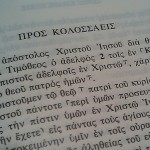Colossians – Contrasting Christ with human wisdom 3

I’m studying through the book of Colossians because I plan to teach through the book during the month of March (and the first Sunday in April). So far, I’ve written these posts in the series:
The beginning of the study
Preliminary outline
Salutation (author, recipients, greeting)
Prayer Part 1
Prayer Part 2
Jesus’ preeminence over creation
Jesus’ preeminence over the church
Paul’s service for the gospel
Contrasting Christ with human wisdom Part 1
Contrasting Christ with human wisdom Part 2
As I continue studying through this section of Colossians, in this post I will focus on this passage:
Therefore let no one pass judgment on you in questions of food and drink, or with regard to a festival or a new moon or a Sabbath. These are a shadow of the things to come, but the substance belongs to Christ. Let no one disqualify you, insisting on asceticism and worship of angels, going on in detail about visions, puffed up without reason by his sensuous mind, and not holding fast to the Head, from whom the whole body, nourished and knit together through its joints and ligaments, grows with a growth that is from God. If with Christ you died to the elemental spirits of the world, why, as if you were still alive in the world, do you submit to regulations – “Do not handle, Do not taste, Do not touch” ( referring to things that all perish as they are used) – according to human precepts and teachings? These have indeed an appearance of wisdom in promoting self-made religion and asceticism and severity to the body, but they are of no value in stopping the indulgence of the flesh. (Colossians 2:16-23 ESV)
In this passage, Paul again warns the Colossians against trusting human traditions, even those that appear to promote some type of wisdom. In our terms, this human wisdom and philosophy would seem to be rational and logical and even religious. However, Paul says to stay away from these things and only trust Christ.
Paul begins by warning that some would attempt to “pass judgment” on the Colossians based upon whether or not they kept certain rules and regulations related to food, drink, or special days. (Colossians 2:16) He immediately jumps to the problem with these kinds of rules and regulations. While they may have had a good purpose in the past, they were only a shadow of the reality that the Colossians now have in Christ himself. (Colossians 2:17)
While the previous warnings may have been against practices related to Judaism, the next warnings are broader, and perhaps dip into some pagan practices. Paul says that some will judge the Colossians based on their views of asceticism, the worship of angels, or following dreams and visions. (Colossians 2:18) Again, the problem with these practices is that growth does not come from them. Instead, Paul says, growth comes only by holding fast to the head (previously identified as Jesus Christ – Colossians 1:18) and being joined together in community with one another. (Colossians 2:19) This is the growth that comes from God.
Paul exhorts his readers based on their new life in Christ. He reminds them that together with Christ they have died to their old life (“Since you died with Christ…”), so they should no longer follow the basic principles that guide this world. (Colossians 2:20) Paul says that the world’s wisdom teaches, “Do not handle; do not taste; do not touch” (and other such prohibitions), but that these kinds of rules and regulations have no power to break the tempations that lead to sin. (Colossians 2:21-23) To the world (and obviously to many Christians today), prohibitions such as these are the basis of following God. But, for the one who is in Christ, they have no value against temptation and sin.
Now, one question we must consider is this: Were the Colossians currently falling for these kinds of human rules and regulations, thinking that they were living godly lives by obeying them? It’s possible. However, it is also possible that Paul was teaching in general. Usually, when Paul is dealing with current problems among the believers of a city, he would say something like, “It has been reported to me…” (1 Corinthians 1:11), or “I am astonished that you…” (Galatians 1:6), and then he would identify the particular problem that exists.
Next, there is a clear warning here for modern churches. Many seem to define themselves based on what they are against or what they do not allow “their members” to do. Paul would teaching against this, saying their is no value for growth in this kind of teaching. Instead, he would exhort them to trust Christ alone, not those rules and regulations of human invention (even those that seem to produce godliness).
What would add to my discussion of this passage?

No Comments
Comments are closed. If you would like to discuss this post, send an email to alan [at] alanknox [dot] net.
Trackbacks/Pingbacks